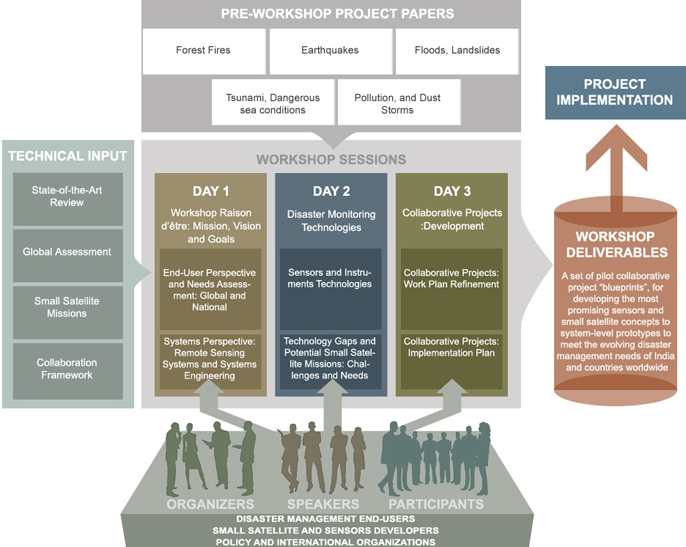|
Format |
|
|
|
The SSTDM 2014 International Workshop is structured to
focus on potential collaborative projects being
developed in each of the selected five disaster
scenarios. We would like to see that we have
well-defined projects, roadmaps, goals, and mission
statements, come out of these activities. Therefore, the
SSTDM 2014 International Workshop has a unique flow-down
format which emphasizes, as its primary deliverables:
(i) A collaborative project framework proposed for
joining as a stakeholder
(ii) The functional issues, costs, timeframes, funding
opportunities and benefits &
(iii) The envisioned benefits to socio-economic and
technology-development pursuits.
Hence a major portion of the workshop will deliberate on
the strengths of potential partners from India and
international community within the thematic areas and
then quickly forge ahead to map the technology gaps.
Following categorization is meant to structure the
workshop sessions along three purposeful tracks:
• Track 1: System architecture, Lessons Learned,
and Challenges
• Track 2: Small Satellite and Sensor Technology
Status
• Track 3: Discussion and Identification of
Collaborative Projects:
The first half-day of the Workshop will provide
participants with the raison d’être of the workshop
covering global earth observation of systems of systems
providing both “Global Perspective of Why, Where, and
How,? as well “Challenges and Needs from Users
perspective focusing on Natural Disaster Management
Strategies in India?.
The goal of the subsequent Sessions and the Panel
talks from Indian and world-class experts is to update
participants on the state-of-the-art in (a) disaster
monitoring technologies and (b) sensors and instruments
technologies, as well needs and lessons learned from
small satellite missions such as CYNGSS, identify
technology Gaps and current challenges related to
international collaboration.
Poster sessions featuring presentations from
student teams and world experts will further complement
the topics covered in the sessions.
The topics covered in the sessions and panel discussions
from part 2 will feed into the third part of the
workshop: participants will apply the knowledge acquired
during the prior sessions and collaborative project
white papers, towards formulating and implementing
project roadmaps. Finally, as a measure of success of
the event, each project team leader will present the
findings and outcome from respective collaborative
projects.

|